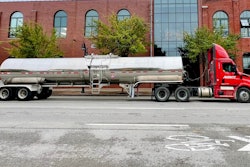“We have been running a fuel surcharge since July 2002, which started at 3 cents a mile. In August it stayed at 3 cents; in September it went to 5 cents; in October, 6 cents; and in November it wavered down to around 5 cents. It’s now up to 13 cents a mile. Our customers, because we have good relationships with them and because we have been working with the same people for quite some time, have paid the fuel surcharge as a cost of doing business. We’re not able to retrieve a surcharge on such things as out-of-route and empty miles, so it is more important than ever to keep a handle on all non-productive items. We have also realized that it is hard to get a fuel surcharge when working with brokers, and we have tried to avoid them. Before we take a load from a broker, sometimes we will let a truck sit.”
Dennis Dellinger, vice president
Cargo Transporters, Claremont, N.C.
“Fuel surcharges.”
Keith Gillespie, director of marketing
Clark Cartage Co. Inc. Green Bay, Wis.
“We have, for a number of years, protected our investments from fuel increases by having fuel surcharges. However, due to the very fast pace of fuel increases, we have been required to take additional measures. These additional measures include stressing the following: fuel conservation methods to produce increased MPG, terminal postings of reports on tractor MPGs along with posting fuel station reports indicating markups per gallon (based on regional cost averages). We’ve seen markups from 5 cents to 18 and 20 cents over the base price. In addition, we have developed internal reporting to ensure that drivers are only fueling at approved locations with a priority on fueling at our own terminals.”
Kenneth Elliot, chief financial officer
NTB Inc., Byron Center, Mich.
“We have asked for and in most cases received help from our customers via fuel surcharges. We are asking continuously for the same help from back load sources such as brokers. We’re not having much success along those lines. We will continue to ask for a surcharge. We’re primarily an owner-operator fleet, and we pass any income directly related to fuel surcharges to them. We will continue to ask because we know they need the help.”
Jeff Jenks, owner
Truckmen Corp., Geneva, Ohio
“Really the only two things you can do are to charge more and reduce idling. We’ve been somewhat successful at recovering the cost increases through a fuel surcharge. About 80 percent of our customers are paying it. Even though we’re getting 80 percent participation, that does not recover 80 percent of the extra cost. We have a good crew of drivers that have been here a long time and understand the cost of idling. They do a good job of keeping our costs down.”
Herb Martin, operations manager
Twin City Transportation, Little Rock, Ark.
Obviously, we’ve done what everyone else is trying to do – that is, recover fuel surcharges from customers. This is the first time in the history of this company that we’ve been terrified at the way prices have gone. We’ve succeeded in getting a surcharge, but that only goes so far. All of our customers have stepped forward, and that’s been a big help, but what scares me is the way fuel prices are climbing up. What people don’t realize is that the cost increases are going back to everybody in the country. Shippers are forced to increase their prices to help carriers out. Go to a store, and you’ll find that everything is going up. Fortunately we have terminal fuel, and our vendor has really helped us out.
Our fuel bill this year has increased by $30,000, and we’ve only recouped 50 percent of that through surcharges. It’s hard because we’re charging upwards of 12 or 13 cents a mile. With fuel prices changing so quickly everyday it makes it hard because some bigger shippers dictate what the surcharge is going to be. Sometimes it’s only half of what it should be. Then it becomes a question of “Do I move it or leave it sitting?”
Rex A. Johnsonbaugh, vice president
J-Line Inc., Altoona, Pa.
“Having seen fuel spikes in the past, we’ve done a better job of being more aggressive in getting fuel surcharges. We’ve had a little bit of help because gasoline has spiked along with the increase in diesel prices. Shippers are more aware of the prices and for the most part, we’ve had a pretty good response. At this point, we’re capturing most increases in the difference between the base price and the cap price. For the last few years, we’ve been involved in fuel hedging programs.
We’re not whole, but we’re in better shape than we have been in the past.”
James McKinney, president
Davis Transport, Missoula, Mont.








